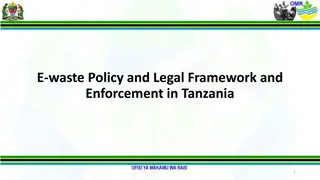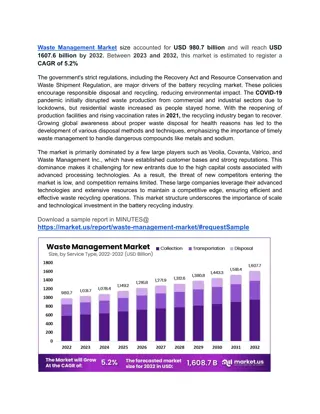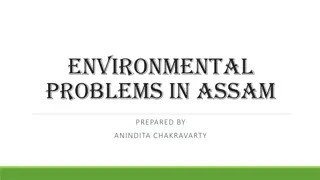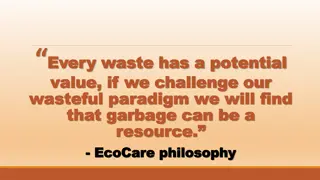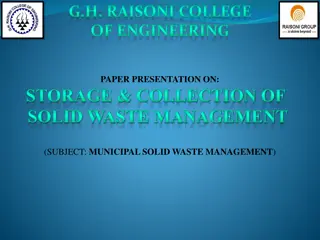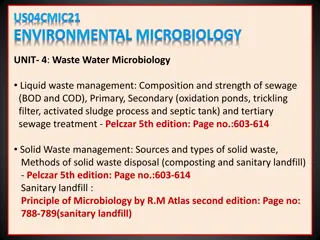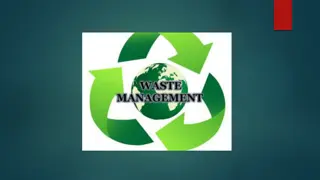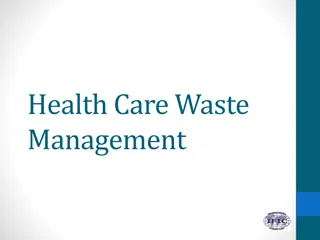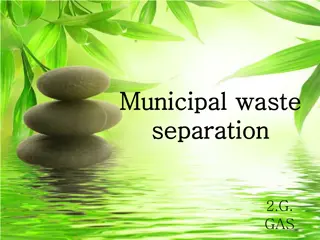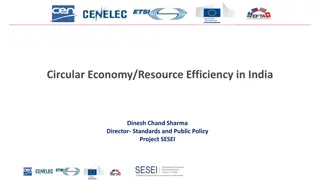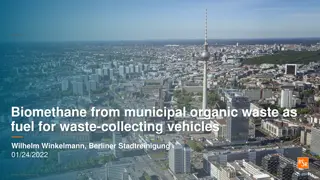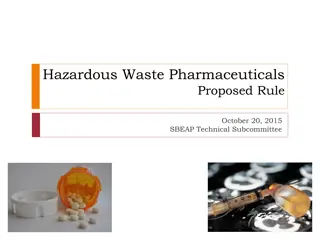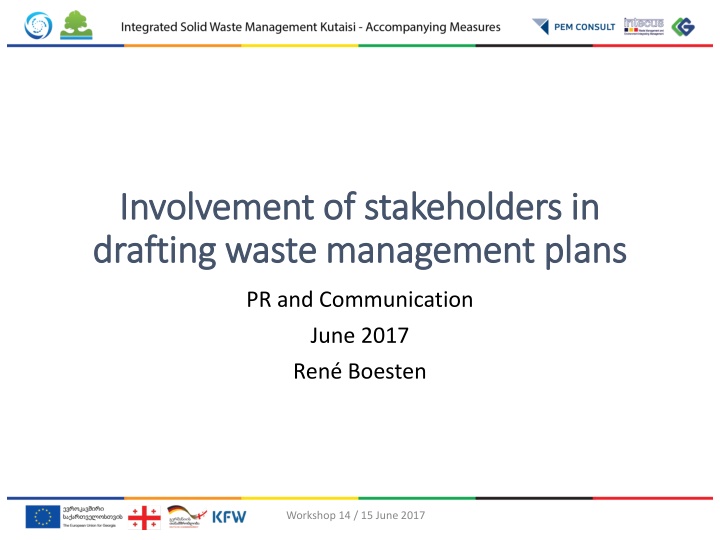
Stakeholder Involvement in Waste Management Planning
Stakeholder involvement is a legal requirement in drafting waste management plans. By involving stakeholders, additional expertise is brought in, difficult topics can be identified and discussed effectively, and common understanding can be built. Dealing with difficult partners involves listening to their opinions, addressing concerns, and including their input in the plans. Critical discussion topics include responsibility, service quality, costs, and waste collection methods.
Download Presentation

Please find below an Image/Link to download the presentation.
The content on the website is provided AS IS for your information and personal use only. It may not be sold, licensed, or shared on other websites without obtaining consent from the author. If you encounter any issues during the download, it is possible that the publisher has removed the file from their server.
You are allowed to download the files provided on this website for personal or commercial use, subject to the condition that they are used lawfully. All files are the property of their respective owners.
The content on the website is provided AS IS for your information and personal use only. It may not be sold, licensed, or shared on other websites without obtaining consent from the author.
E N D
Presentation Transcript
Involvement of stakeholders in Involvement of stakeholders in drafting waste management drafting waste management plans plans PR and Communication June 2017 Ren Boesten Workshop 14 / 15 June 2017
Stakeholder Stakeholder involvement involvement legal requirement: Waste management code Article 13, paragraph 3: Prior to the adoption of a municipal waste management plan, public discussion involving interested parties and representatives of neighboring municipalities shall be held. Public discussion shall be carried out by the respective municipality (municipalities). Obliged to involve stakeholders in the elaboration! Workshop 14 / 15 June 2017
Stakeholder Stakeholder involvement involvement Who are Stakeholders and interested parties ? Any individual or organisation that might be affected by the plan or that might facilitate implementation Business associations, local (tourism) industry Educational institutions schools, universities, professional schools, kindergarden NGOs and other civil organisations and active community groups Workshop 14 / 15 June 2017
What are the benefits of involvement? What are the benefits of involvement? Bring in additional expertise and experience Make them co-authors creates commitment Identify and discuss difficult topics as part of the preparation in stead of corrections afterwards Talking and dialogue can break barriers and build a common understanding of issues Workshop 14 / 15 June 2017
How to deal with difficult partners? How to deal with difficult partners ? Listen to other opinions learn about and understand the arguments, the fears and the reasons for a different position Make a proposal to address their concerns and discuss it with them Include the conclusions in the plan; they don t need to agree with all your plans, but they should understand why you do it Workshop 14 / 15 June 2017
Identify discussion topics Identify discussion topics What might be seen as critically by the stakeholders: Who is responsible (polluter pays principle)? Quality of services Costs and waste service charge Separate collection Waste from others industrial waste, construction waste, carcasses Workshop 14 / 15 June 2017
How to deal with difficult topics? How to deal with difficult topics? Discuss these topics with the stakeholders - NGOs, civil initiatives, business community find a common ground, allow space for other solutions or agree to disagree Insert conclusions in the WM plan Workshop 14 / 15 June 2017
How to organise How to organise it? it? Use your existing network and relations The stakeholders are citizens and represent the citizens, they spread messages directly to other citizens You are citizen and you are probably linked with most stakeholders Include stakeholders in the working groups that prepares the WM plan Organise a discussion evening in the local pub, discuss 1 or 2 topics Workshop 14 / 15 June 2017
How to organise it? How to organise it? As soon as first ideas of planning part are done: Discuss these first ideas in the working group with the stakeholders Host a discussion evening in the local pub After inclusion of results of these discussions: Publish plan on your website, send it to key stakeholders; Organise a final meeting with all key stakeholders Organise a public discussion (the legal requirement) Formal discussion in Sakrebulo Workshop 14 / 15 June 2017
Discussion Discussion topics for topics for working groups working groups Who are your stakeholders; make a list What are their interests and needs; Who might be difficult , who might be supportive; What are the key topics? make a list Match stakeholder and topic Decide when to involve the stakeholder Workshop 14 / 15 June 2017
Stakeholder Matrix Stakeholder Matrix Stakeholder A Stakeholder B Stakeholder C Stakeholder D Municipality A Municipality B Topic 1 ++ -- Topic 2 ++ - Topic 3 -- + Topic 4 0 Topic 5 ++ Very cooperative / good relations -- Difficult relationship / possible conflict of interests Workshop 14 / 15 June 2017



